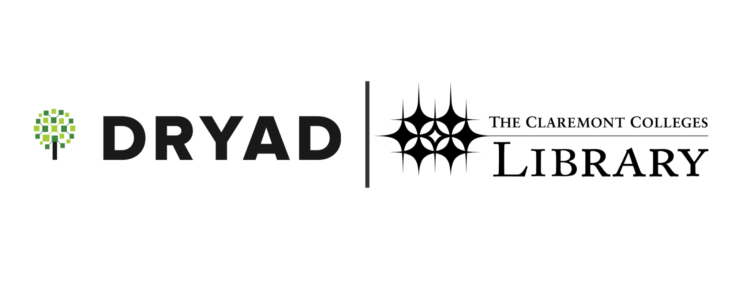Dryad Data Repository
The Claremont Colleges Library is an institutional member of Dryad, a data repository which provides a platform to help make research data discoverable, freely reusable, and cite-able. Any researcher associated with the Claremont Colleges can deposit datasets from any discipline into Dryad at no cost. Dryad is one of many data repositories that can be used to share research data.
Why Use Dryad?
- Dryad can help make your data Findable, Accessible, Interoperable and Reusable (FAIR) as encouraged by funders and journals
- You can publish and get a DOI for your data set
- Dryad will track usage and downloads of your datasets following the Make Data Count project guidelines.
- Dryad supports most data file types across disciplines
You should not use Dryad if:
- Your data is too sensitive to share publicly
- You cannot agree to the CC0 license
- Your data set is larger than 300GB (for datasets larger than 300GB, contact Dryad)
- If you need to share your articles or other text documents, use The Claremont Colleges institutional repository, Scholarship@Claremont
- Go to Dryad’s homepage. Click the Login button in the upper-right corner of the screen.
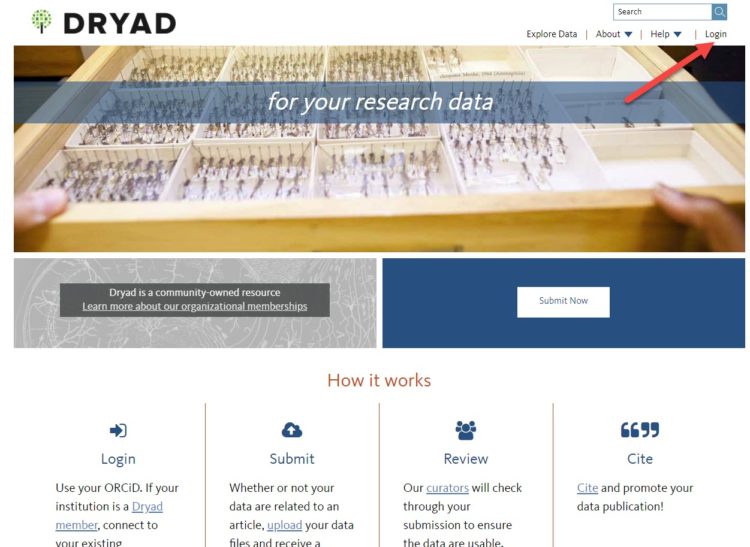
- Click the Login or create your ORCID iD button.
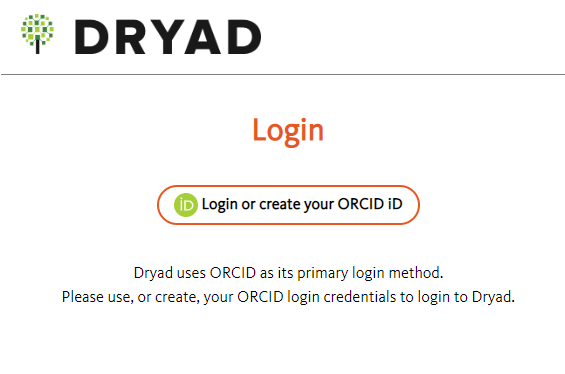
- Enter your ORCID iD or Email address and your ORCID password and click the Sign into ORCID button. If you do not have an ORCID iD, you can click the Register now link to sign up.
- Click the Authorize button to connect your ORCID iD to your Dryad account on the next screen. In the future you will be able to log in into Dryad using only your ORCID iD and password.
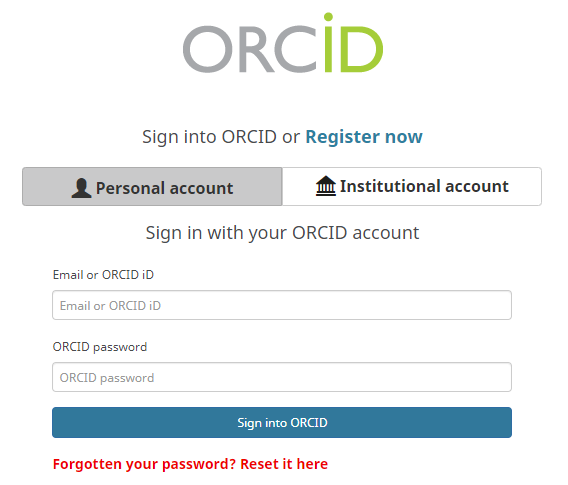
- Choose your institution from the drop-down menu under the Your Institution may be a member of Dryad heading. Click the Login to verify button.
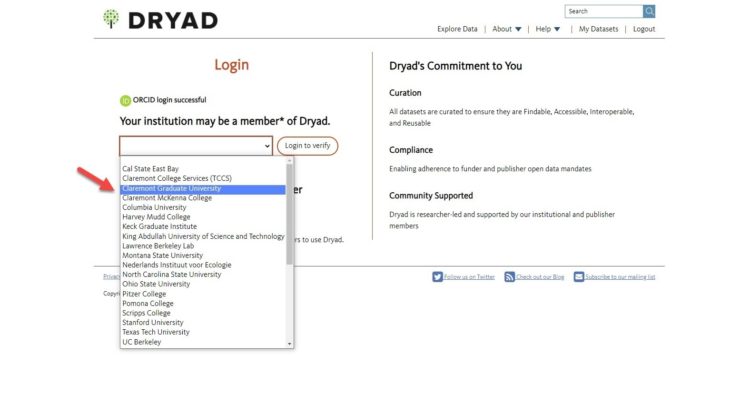
- Login with your college credentials and password. Click the Accept button to connect your Dryad account with our institutional membership. You will be redirected to the CAS login page and should not need to perform this login in the future.
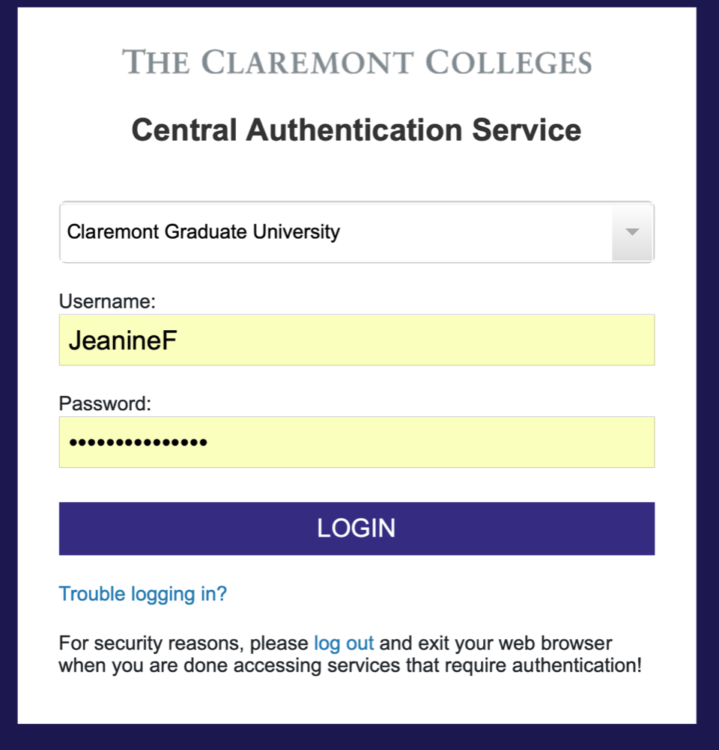
- You are officially logged into The Claremont Colleges Dryad membership! You can click on the Start New Dataset button to begin submitting your dataset.
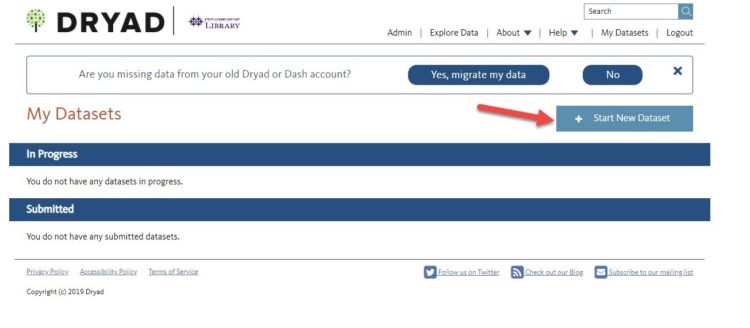
- Contact Dryad directly at help@dryad.orgfor technical assistance and help with your data submission.
- More information about the Dryad data submission process is available.
- Explore Dryad’s FAQs
- Contact us at [email]DigitalScholarship@claremont.edu[/email] for additional help with metadata or questions about managing your data.
- Review our Managing Research Data guide.
Anyone can submit data into Dryad for a cost. However, our institutional membership means Claremont Colleges researchers can submit datasets for free.
The Claremont Colleges Library provides access to Dryad for students, faculty and staff of Pomona College, Claremont Graduate University, Scripps College, Claremont McKenna College, Harvey Mudd College, Pitzer College, Keck Graduate Institute, the Library, and affiliated scholars.
Dryad used to be for specific disciplines only, but is categorized as a general data repository because it now accepts data from all disciplines. However, if you are submitting data to Dryad to comply with certain publisher or funder requirements, check which data repositories they recommend before submitting your data to Dryad.
No– Dryad no longer requires that data be associated with a publication.
Dryad is for data that is final and publication-ready.
Dryad integrates with several publishers and will link data with publications when they exist. Dryad also recommends that the data be cited in the references of the original publication so that the link between the publication and data is indexed by third-party services
Users can upload datasets that are 300GBs or less through the web interface. Larger datasets will be considered on a case-by-case basis by Dryad. Researchers should contact Dryad at help@datadryad.org for help.
To upload files into Dryad of more than 10GB, you need to use the “upload by URL” option on the data upload page during submission. If the files can be stored on Box, Dropbox, Amazon, or a lab server, that would be the easiest way to transfer them over. Direct upload of files over 10GB files are not allowed because of servers time-out issues.
Currently, only files less than 3GB will effectively transfer from Google Drive to Dryad.
Dryad currently only offers a CC0 license.
Data in Dryad is openly discoverable and downloadable. Data cannot contain any sensitive, restricted, or confidential information.
Dryad offers the option to make the dataset private during a related article’s peer review process.
Dryad tracks download, views, and citation metrics.
Dryad offers “light-weight” curation for all datasets to make data more FAIR (Findable, Accessible, Interoperable, Reusable). In the future, we may offer more support locally for data curation from Claremont Colleges researchers.
Dryad reserves a DOI immediately when a depositor begins a dataset submission, which is why the DOI appears on page 3 of the data submission process. The DOI is registered and can be resolved as soon as something is published, which occurs once the Dryad staff completes their data curation step (Dryad estimates this step to take 1-2 weeks). The DOI is unresolvable during the curation process, but Dryad reserves the DOI up front in case people need to provide it to a journal or update a DMP.
The institutional membership comes with services from the Dryad team such as hosting the platform, software updates, storage hardware maintenance, curation, waived data publication costs for Claremont researchers, and perpetual data hosting. These are attractive to us. Additionally, we are interested in their upcoming plans for integrations with 1) journals, 2) funders, and 3) Zenodo. Dryad is also flexible with local customization, which is something we’d like to explore in the future.
No. As mentioned above, Dryad may not be the best solution for all of our researchers. If there is a disciplinary repository, we always recommend that you use that for greater visibility and impact. There may also be considerations depending on if you are grant funded, and/or if you are working with a publisher. Choosing a repository solution currently is not a one size fits all, and the Library is here to consult and offer advice when making these decisions.
